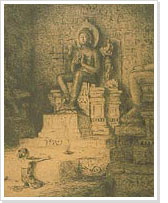Colonial World Fairs > Changing stories
 During the World Fairs held between 1800 and 1931 the role of colonizer initially assumed by the Netherlands underwent a change.
During the World Fairs held between 1800 and 1931 the role of colonizer initially assumed by the Netherlands underwent a change.
Amsterdam: 1883
At the Amsterdam World Fair, the Netherlands evoked curiosity among the public with presentations of societies in the East Indies, Surinam and the Antilles. A strong emphasis was placed on trading, suggesting that colonialism was of great economic importance to the Netherlands.
Brussels: 1910
At the Brussels World Fair, the accent shifted to the Netherlands as the bearer of progress in the colonies. This brand of ethical politics was expounded by means of sleek, innovative design. In addition, a great deal of attention was paid to the age-old Javanese culture. The Netherlands, brimming with self-confidence, ranked itself with England, the colonizer of British India.
Paris: 1931
In Paris, the Dutch sense of self-importance was predominant. Under the motto ‘where something great was accomplished’, the emphasis was placed on the modernization that had been achieved under Dutch leadership. The public was treated to an idyllic picture of the cultural and religious life of the indigenous population (mainly Balinese). Not a word was said about political consciousness and the struggle for independence among the East Indians.
